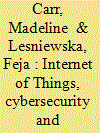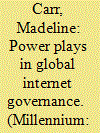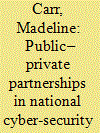|
|
|
Sort Order |
|
|
|
Items / Page
|
|
|
|
|
|
|
| Srl | Item |
| 1 |
ID:
123785


|
|
|
|
|
| Publication |
2013.
|
| Summary/Abstract |
Internet freedom is rapidly becoming understood as a normative framework for how the Internet should function and be used globally. Recently declared a human right by the United Nations, it also forms a central pillar of the USA's 21st Century Statecraft foreign policy doctrine. This article argues that although there is a clear human rights agenda present in this policy, there is also a power element which is much less discussed or acknowledged in the vast literature on Internet freedom. Through an exploration of both a short history and some important lessons learned about Internet freedom, this article demonstrates how the US Department of State has adapted to the information age in such a way as to harness individual agency (reconceptualised in policy terms as 'civilian power') for the promotion of state power. Although this is by no means as stable or reliable as some more conventional mechanisms, it is an expression of power that meets with few challenges to its legitimacy.
|
|
|
|
|
|
|
|
|
|
|
|
|
|
|
|
| 2 |
ID:
175171


|
|
|
|
|
| Summary/Abstract |
The implementation of the Internet of Things (IoT) is central to what the World Economic Forum has coined the ‘Fourth Industrial Revolution’; a technological revolution built upon cyber-physical systems that will blur the lines between the physical, digital and biological spheres. Novel interconnections will emerge as a result, challenging traditional relations and modes of governance. However, a central feature of the IoT is that the implications of cyber (in)security are no longer abstract. The IoT also returns us to the world of kinetic effects in international relations; more familiar territory for IR. The resulting cooperation and coordination challenges are transboundary in nature, occur at multiple levels across sectors, between institutions, and will impact all actors, both public and private, in complex, often highly politicised ways. In this article we argue that advances in global climate governance appear to be offering an early model of a consensual rules-based approach within the existing international order that provides space for advancing agility, flexibility, and polycentrism to meet the demands of ‘wicked problems’ like the cybersecurity of the IoT. Perhaps one of the most important lessons to be drawn across from climate governance is the role of robust mechanisms for knowledge exchange – specifically between the technical and policy communities.
|
|
|
|
|
|
|
|
|
|
|
|
|
|
|
|
| 3 |
ID:
141208


|
|
|
|
|
| Summary/Abstract |
The multi-stakeholder model of global Internet governance has emerged as the dominant approach to navigating the complex set of interests, agendas and implications of our increasing dependence on this technology. Protecting this model of global governance in this context has been referred to by the US and EU as ‘essential’ to the future of the Internet. Bringing together actors from the private sector, the public sector and also civil society, multi-stakeholder Internet governance is not only regarded by many as the best way to organise around this particular issue, it is also held up as a potential template for the management of other ‘post-state’ issues. However, as a consequence of its normative aspirations to representation and power sharing, the multi-stakeholder approach to global Internet governance has received little critical attention. This paper examines the issues of legitimacy and accountability with regard to the ‘rule-makers’ and ‘rule-takers’ in this model and finds that it can also function as a mechanism for the reinforcement of existing power dynamics.
|
|
|
|
|
|
|
|
|
|
|
|
|
|
|
|
| 4 |
ID:
145264


|
|
|
|
|
| Summary/Abstract |
Despite its centrality in the national cyber security strategies of the US and the UK, the public–private partnership is a nebulous arrangement, which is especially problematic in the context of critical infrastructure protection. Privately owned and operated critical infrastructure that is regarded as a potential national security vulnerability raises questions about the allocation of responsibility and accountability in terms of cyber security. As with many aspects of cyber security, this issue is often discussed with little reference to previous scholarship that could provide conceptual scaffolding. This article draws on the extensive literature on public–private partnerships in order to assess the tensions and challenges of this arrangement in national cyber-security strategies. It finds that there is a serious disjuncture in expectations from both ‘partners’. The government regards privately owned and operated critical infrastructure as a key element of national security but is reluctant to claim a mandate to oversee network security. At the same time, the private sector is not inclined to accept responsibility or liability for national cyber security. This challenge for governments to manage national cyber security raises questions about how well equipped these states are to promote their own security in the information age. Acknowledging the flaws in the ‘partnership’ is an essential step towards addressing them.
|
|
|
|
|
|
|
|
|
|
|
|
|
|
|
|
|
|
|
|
|